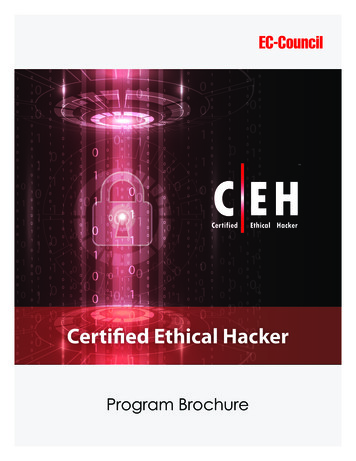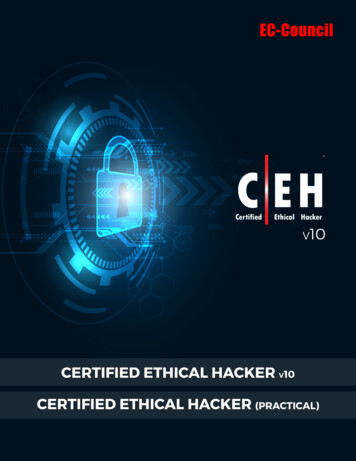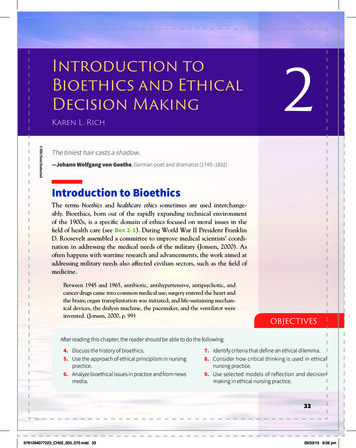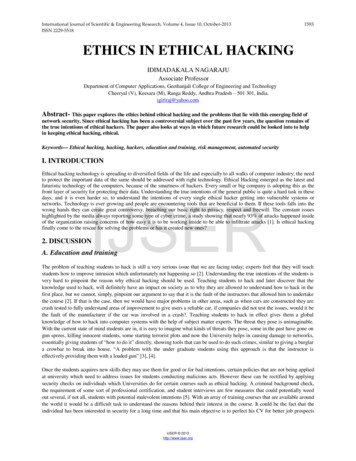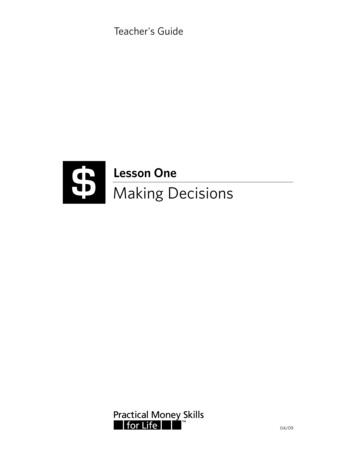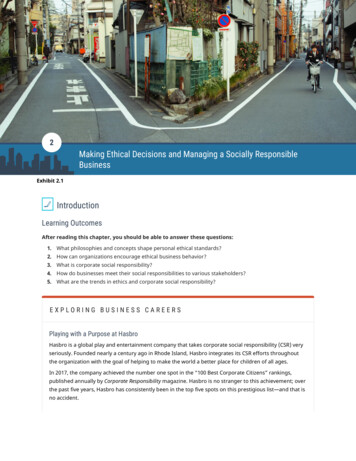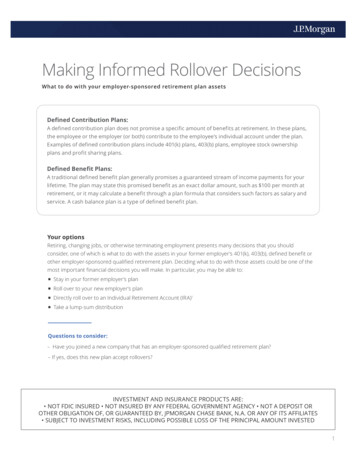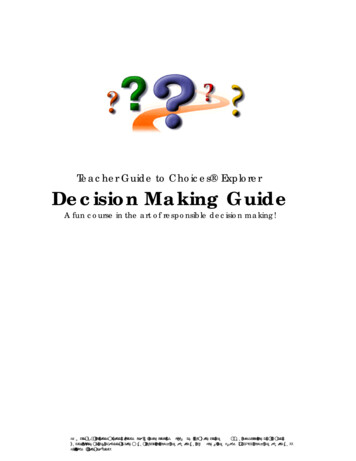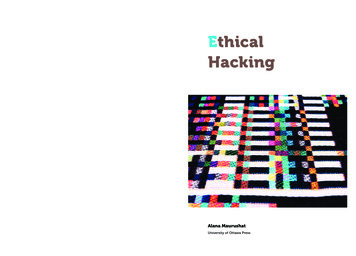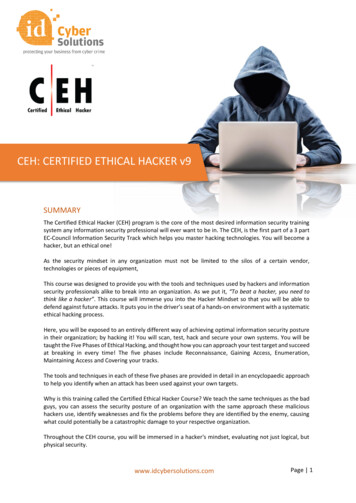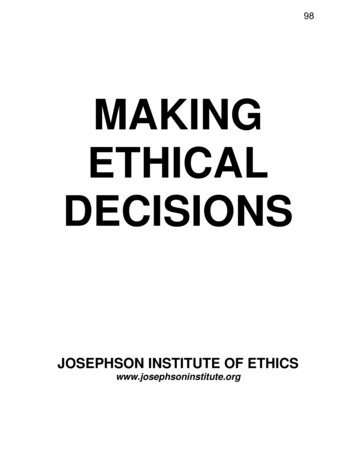
Transcription
98MAKINGETHICALDECISIONSJOSEPHSON INSTITUTE OF ETHICSwww.josephsoninstitute.org
99MAKING ETHICAL DECISIONSJOSEPHSON INSTITUTE OF ETHICSwww.josephsoninstitute.orgTABLE OF CONTENTSINTRODUCTION1. MAKING SENSE OF ETHICS What Is Ethics? The Importance of Universality When Values Collide From Values to Principles Ethics and Action Why Be Ethical?2. THE SIX PILLARS OF CHARACTER Trustworthiness- Honesty- Integrity- Reliability (Promise-keeping)- Loyalty Respect- Civility, Courtesy and Decency- Dignity and Autonomy- Tolerance and Acceptance Responsibility- Accountability- Pursuit of Excellence- Self-Restraint Fairness- Process- Impartiality- Equity Caring Citizenship3. GROUNDWORK FOR MAKING AN EFFECTIVE DECISION Taking Choices Seriously Recognizing Important Decisions Good Decisions Are Both Ethical and EffectiveExample: Suzy and Sue Discernment and Discipline StakeholdersExample: Charlie and the "Harmless" Prank4. THE SEVEN-STEP PATH TO BETTER DECISIONS1. Stop and Think2. Clarify Goals3. Determine Facts4. Develop Options
1005. Consider Consequences6. Choose7. Monitor and Modify5. OBSTACLES TO ETHICAL DECISION MAKING: RATIONALIZATIONS If It's Necessary, It's Ethical The False Necessity Trap If It's Legal and Permissible, It's Proper It's Just Part of the Job It's All for a Good Cause I Was Just Doing It for You I'm Just Fighting Fire With Fire It Doesn't Hurt Anyone Everyone's Doing It It's OK if I Don't Gain Personally I've Got It Coming I Can Still Be Objective6. BEING THE PERSON YOU WANT TO BE Where Does Character Come From? On Happiness
101INTRODUCTIONSay you are the widowed parent of three children. You have no immediate family or close friends. A severerecession has left you jobless for 18 months. Your skills are not in demand. Six months ago you started lookingoutside your field, increasingly willing to take anything. But even minimum wage positions were scarce and didnot pay enough for one person to live on, much less four. You’re deep in debt and have filed for bankruptcy.The stress has triggered your diabetes; you have no medical coverage. You are three months overdue on the rentand have been served with an eviction notice. You’ve been trying to keep a cheerful, hopeful attitude for yourchildren, who so far don’t know the extent of the family’s woes.Now a job you applied for 12 months ago has come up. The salary is higher than any you’ve ever received andthe benefits package would cover your whole family. You are told the choice is between you and one otherperson, but you have to swear in writing that you have never taken illegal drugs. Trouble is, you have. You usedto smoke marijuana, not a lot, but regularly. You have never taken any other illegal drug and you don’t usemarijuana anymore either — but that hasn’t changed your opinion that it is absurd and hypocritical thatmarijuana is illegal while alcohol and nicotine — which every year kill millions and cost society billions —aren’t.So, do you lie on the application?Few choices we face are so difficult, but you get the point: being ethical isn’t always easy. Yet it is alwaysimportant. For we live with a common truth: everything we say and do represents a choice, and how we decidedetermines the shape of our lives.Making ethical decisions requires the ability to make distinctions between competing choices. It requirestraining, in the home and beyond. That’s where this booklet comes in. Making Ethical Decisions is a blueprintto help the reader arrive at sound decisions. For more than a dozen years, various versions of this publicationhave served as the basic primer of the Josephson Institute of Ethics, a nonprofit teaching, training andconsulting organization based in Marina del Rey, California, and active nationwide. The Institute advocatesprincipled decision-making based on six values that cut across time, culture, politics, religion, ethnicity andother human division. These values, called the "Six Pillars of Character," are trustworthiness, respect,responsibility, fairness, caring and good citizenship (responsible participation in society). The Six Pillars arethe basis of ethically defensible decisions and the foundation of well-lived lives.This edition of Making Ethical Decisions represents a substantial re-working of earlier editions, offering newexamples and intensifying the focus on discernment, discipline and effectiveness as vital elements of ethicaldecision making.Yet however much the material is reworked, the real work remains with you. No one can simply read aboutethics and become ethical. It’s not that easy. People have to make many decisions under economic, professionaland social pressure. Rationalization and laziness are constant temptations. But making ethical decisions is worthit, if you want a better life and a better world. Keep in mind that whether for good or ill, change is always just adecision away.— Wes Hanson, editor
102CHAPTER 1: MAKING SENSE OF ETHICSShould I lie on a job application to spare my children from being thrown in the street? Should I ignore myboss’s hypocrisies to keep my position? Making ethical decisions can be difficult. We make most of them in aworld of economic, professional and social pressures, which can obscure moral issues. Often we don’t know orunderstand crucial facts. We must rank competing moral claims and must be able to predict the likelyconsequences of choices.Ethical decision making requires more than a belief in the importance of ethics. It also requires ethicalsensitivity to implications of choices, the ability to evaluate complex, ambiguous and incomplete facts, and theskill to implement ethical decisions effectively.Most of all, it requires a framework of principles that are reliable (such as the Six Pillars of Character) and aprocedure for applying them to problems. This booklet provides both.What Is Ethics?Ethics refers to principles that define behavior as right, good and proper. Such principles do not always dictate asingle "moral" course of action, but provide a means of evaluating and deciding among competing options.The terms "ethics" and "values" are not interchangeable. Ethics is concerned with how a moral person shouldbehave, whereas values are the inner judgments that determine how a person actually behaves. Values concernethics when they pertain to beliefs about what is right and wrong. Most values, however, have nothing to dowith ethics. For instance, the desire for health and wealth are values, but not ethical values.The Importance of UniversalityMost people have convictions about what is right and wrong based on religious beliefs, cultural roots, familybackground, personal experiences, laws, organizational values, professional norms and political habits. Theseare not the best values to make ethical decisions by — not because they are unimportant, but because they arenot universal.In contrast to consensus ethical values — such basics as trustworthiness, respect, responsibility, fairness, caringand citizenship — personal and professional beliefs vary over time, among cultures and among members of thesame society. They are a source of continuous historical disagreement, even wars. There is nothing wrong withhaving strong personal and professional moral convictions about right and wrong, but unfortunately, somepeople are "moral imperialists" who seek to impose their personal moral judgments on others. The universalethical value of respect for others dictates honoring the dignity and autonomy of each person and cautionsagainst self-righteousness in areas of legitimate controversy.When Values CollideOur values are what we prize and our values system is the order in which we prize them. Because they rank ourlikes and dislikes, our values determine how we will behave in certain situations. Yet values often conflict. Forexample, the desire for personal independence may run counter to our desire for intimacy. Our desire to behonest may clash with the desire to be rich, prestigious or kind to others. In such cases, we resort to our valuessystem. The values we consistently rank higher than others are our core values, which define character andpersonality.From Values to PrinciplesWe translate values into principles so they can guide and motivate ethical conduct. Ethical principles are therules of conduct that derive from ethical values. For example, honesty is a value that governs behavior in theform of principles such as: tell the truth, don’t deceive, be candid, don’t cheat. In this way, values give rise toprinciples in the form of specific "dos" and "don’ts."
103Ethics and ActionEthics is about putting principles into action. Consistency between what we say we value and what our actionssay we value is a matter of integrity.It is also about self-restraint:***Not doing what you have the power to do. An act isn’t proper simply because it is permissible or youcan get away with it.Not doing what you have the right to do. There is a big difference between what you have the right to doand what is right to do.Not doing what you want to do. In the well-worn turn of phrase, an ethical person often chooses to domore than the law requires and less than the law allows.Why Be Ethical?People have lots of reasons for being ethical:*****There is inner benefit. Virtue is its own reward.There is personal advantage. It is prudent to be ethical. It’s good business.There is approval. Being ethical leads to self-esteem, the admiration of loved ones and the respect ofpeers.There is religion. Good behavior can please or help serve a deity.There is habit. Ethical actions can fit in with upbringing or training.There are obstacles to being ethical, which include:**The ethics of self-interest. When the motivation for ethical behavior is self-interest, decision-making isreduced to risk-reward calculations. If the risks from ethical behavior are high — or the risks fromunethical behavior are low and the reward is high — moral principles succumb to expediency. This isnot a small problem: many people cheat on exams, lie on resumes, and distort or falsify facts at work.The real test of our ethics is whether we are willing to do the right thing even when it is not in our selfinterest.The pursuit of happiness. Enlightenment philosophers and the American Founding Fathers enshrined thepursuit of happiness as a basic right of free men. But is this pursuit a moral end in itself? It depends onhow one defines happiness. Our values, what we prize and desire, determine what we think will make ushappy. We are free to pursue material goals and physical sensations, but that alone rarely (if ever) leadsto enduring happiness. It more often results in a lonely, disconnected, meaningless existence. Themorally mature individual finds happiness in grander pursuits than money, status, sex and mood-alteringsubstances. A deeper satisfaction lies in honoring universal ethical values, that is, values that peopleeverywhere believe should inform behavior. That unity between principled belief and honorablebehavior is the foundation for real happiness.
104CHAPTER 2: THE SIX PILLARS OF CHARACTERTrustworthiness. Respect. Responsibility. Fairness. Caring. Citizenship. The Six Pillars of Character areethical values to guide our choices. The standards of conduct that arise out of those values constitute the groundrules of ethics, and therefore of ethical decision-making.There is nothing sacrosanct about the number six. We might reasonably have eight or 10, or more. But mostuniversal virtues fold easily into these six. The number is not unwieldy and the Six Pillars of Character canprovide a common lexicon. Why is a common lexicon necessary? So that people can see what unites our diverseand fractured society. So we can communicate more easily about core values. So we can understand ethicaldecisions better, our own and those of others.The Six Pillars act as a multi-level filter through which to process decisions. So, being trustworthy is notenough — we must also be caring. Adhering to the letter of the law is not enough — we must acceptresponsibility for our action or inaction.The Pillars can help us detect situations where we focus so hard on upholding one moral principle that wesacrifice another — where, intent on holding others accountable, we ignore the duty to be compassionate;where, intent on getting a job done, we ignore how.In short, the Six Pillars can dramatically improve the ethical quality of our decisions, and thus our character andlives.1. TRUSTWORTHINESSWhen others trust us, they give us greater leeway because they feel we don’t need monitoring to assure thatwe’ll meet our obligations. They believe in us and hold us in higher esteem. That’s satisfying. At the same time,we must constantly live up to the expectations of others and refrain from even small lies or self-servingbehavior that can quickly destroy our relationships.Simply refraining from deception is not enough. Trustworthiness is the most complicated of the six core ethicalvalues and concerns a variety of qualities like honesty, integrity, reliability and loyalty.HonestyThere is no more fundamental ethical value than honesty. We associate honesty with people of honor, and weadmire and rely on those who are honest. But honesty is a broader concept than many may realize. It involvesboth communications and conduct.Honesty in communications is expressing the truth as best we know it and not conveying it in a way likely tomislead or deceive. There are three dimensions:Truthfulness. Truthfulness is presenting the facts to the best of our knowledge. Intent is the crucialdistinction between truthfulness and truth itself. Being wrong is not the same thing as lying, although honestmistakes can still damage trust insofar as they may show sloppy judgment.Sincerity. Sincerity is genuineness, being without trickery or duplicity. It precludes all acts, including halftruths, out-of-context statements, and even silence, that are intended to create beliefs or leave impressionsthat are untrue or misleading.Candor. In relationships involving legitimate expectations of trust, honesty may also require candor,forthrightness and frankness, imposing the obligation to volunteer information that another person needs toknow.Honesty in conduct is playing by the rules, without stealing, cheating, fraud, subterfuge and other trickery.Cheating is a particularly foul form of dishonesty because one not only seeks to deceive but to take advantageof those who are not cheating. It’s a two-fer: a violation of both trust and fairness.Not all lies are unethical, even though all lies are dishonest. Huh? That’s right, honesty is not an inviolateprinciple. Occasionally, dishonesty is ethically justifiable, as when the police lie in undercover operations or
105when one lies to criminals or terrorists to save lives. But don’t kid yourself: occasions for ethically sanctionedlying are rare and require serving a very high purpose indeed, such as saving a life — not hitting amanagement-pleasing sales target or winning a game or avoiding a confrontation.IntegrityThe word integrity comes from the same Latin root as "integer," or whole number. Like a whole number, aperson of integrity is undivided and complete. This means that the ethical person acts according to her beliefs,not according to expediency. She is also consistent. There is no difference in the way she makes decisions fromsituation to situation, her principles don’t vary at work or at home, in public or alone.Because she must know who she is and what she values, the person of integrity takes time for self-reflection, sothat the events, crises and seeming necessities of the day do not determine the course of her moral life. Shestays in control. She may be courteous, even charming, but she is never duplicitous. She never demeans herselfwith obsequious behavior toward those she thinks might do her some good. She is trusted because you knowwho she is: what you see is what you get.People without integrity are called "hypocrites" or "two-faced."Reliability (Promise-Keeping)When we make promises or other commitments that create a legitimate basis for another person to rely upon us,we undertake special moral duties. We accept the responsibility of making all reasonable efforts to fulfill ourcommitments. Because promise-keeping is such an important aspect of trustworthiness, it is important to:Avoid bad-faith excuses. Interpret your promises fairly and honestly. Don’t try to rationalizenoncompliance.Avoid unwise commitments. Before making a promise consider carefully whether you are willing andlikely to keep it. Think about unknown or future events that could make it difficult, undesirable orimpossible. Sometimes, all we can promise is to do our best.Avoid unclear commitments. Be sure that, when you make a promise, the other person understands whatyou are committing to do.LoyaltySome relationships — husband-wife, employer-employee, citizen-country — create an expectation ofallegiance, fidelity and devotion. Loyalty is a responsibility to promote the interests of certain people,organizations or affiliations. This duty goes beyond the normal obligation we all share to care for others.Limitations to loyalty. Loyalty is a tricky thing. Friends, employers, co-workers and others may demandthat we rank their interests above ethical considerations. But no one has the right to ask another to sacrificeethical principles in the name of a special relationship. Indeed, one forfeits a claim of loyalty when he or sheasks so high a price for maintaining the relationship.Prioritizing loyalties. So many individuals and groups make loyalty claims on us that we must rank ourloyalty obligations in some rational fashion. For example, it’s perfectly reasonable, and ethical, to look outfor the interests of our children, parents and spouses even if we have to subordinate our obligations to otherchildren, neighbors or co-workers in doing so.Safeguarding confidential information. Loyalty requires us to keep some information confidential. Whenkeeping a secret breaks the law or threatens others, however, we may have a responsibility to "blow thewhistle."Avoiding conflicting interests. Employees and public servants have a duty to make all professionaldecisions on merit, unimpeded by conflicting personal interests. They owe ultimate loyalty to the public.
1062. RESPECTPeople are not things, and everyone has a right to be treated with dignity. We certainly have no ethical duty tohold all people in high esteem, but we should treat everyone with respect, regardless of who they are and whatthey have done. We have a responsibility to be the best we can be in all situations, even when dealing withunpleasant people.The Golden Rule — do unto others as you would have them do unto you — nicely illustrates the Pillar ofrespect. Respect prohibits violence, humiliation, manipulation and exploitation. It reflects notions such ascivility, courtesy, decency, dignity, autonomy, tolerance and acceptance.Civility, Courtesy and DecencyA respectful person is an attentive listener, although his patience with the boorish need not be endless (respectworks both ways). Nevertheless, the respectful person treats others with consideration, and doesn’t resort tointimidation, coercion or violence except in extraordinary and limited situations to defend others, teachdiscipline, maintain order or achieve social justice. Punishment is used in moderation and only to advanceimportant social goals and purposes.Dignity and AutonomyPeople need to make informed decisions about their own lives. Don’t withhold the information they need to doso. Allow all individuals, including maturing children, to have a say in the decisions that affect them.Tolerance and AcceptanceAccept individual differences and beliefs without prejudice. Judge others only on their character, abilities andconduct.3. RESPONSIBILITYLife is full of choices. Being responsible means being in charge of our choices and, thus, our lives. It meansbeing accountable for what we do and who we are. It also means recognizing that our actions matter and we aremorally on the hook for the consequences. Our capacity to reason and our freedom to choose make us morallyautonomous and, therefore, answerable for whether we honor or degrade the ethical principles that give lifemeaning and purpose.Ethical people show responsibility by being accountable, pursuing excellence and exercising self-restraint.They exhibit the ability to respond to expectations.AccountabilityAn accountable person is not a victim and doesn’t shift blame or claim credit for the work of others. Heconsiders the likely consequences of his behavior and associations. He recognizes the common complicity inthe triumph of evil when nothing is done to stop it. He leads by example.Pursuit of ExcellenceThe pursuit of excellence has an ethical dimension when others rely upon our knowledge, ability or willingnessto perform tasks safely and effectively.Diligence. It is hardly unethical to make mistakes or to be less than "excellent," but there is a moralobligation to do one’s best, to be diligent, reliable, careful, prepared and informed.Perseverance. Responsible people finish what they start, overcoming rather than surrendering to obstacles.They avoid excuses such as, "That’s just the way I am," or "It’s not my job," or "It was legal."Continuous Improvement. Responsible people always look for ways to do their work better.
107Self-RestraintResponsible people exercise self-control, restraining passions and appetites (such as lust, hatred, gluttony, greedand fear) for the sake of longer-term vision and better judgment. They delay gratification if necessary and neverfeel it’s necessary to "win at any cost." They realize they are as they choose to be, every day.4. FAIRNESSWhat is fairness? Most would agree it involves issues of equality, impartiality, proportionality, openness anddue process. Most would agree that it is unfair to handle similar matters inconsistently. Most would agree that itis unfair to impose punishment that is not commensurate with the offense. The basic concept seems simple,even intuitive, yet applying it in daily life can be surprisingly difficult. Fairness is another tricky concept,probably more subject to legitimate debate and interpretation than any other ethical value. Disagreeing partiestend to maintain that there is only one fair position (their own, naturally). But essentially fairness impliesadherence to a balanced standard of justice without relevance to one’s own feelings or inclinations.ProcessProcess is crucial in settling disputes, both to reach the fairest results and to minimize complaints. A fair personscrupulously employs open and impartial processes for gathering and evaluating information necessary to makedecisions. Fair people do not wait for the truth to come to them; they seek out relevant information andconflicting perspectives before making important judgments.ImpartialityDecisions should be made without favoritism or prejudice.EquityAn individual, company or society should correct mistakes, promptly and voluntarily. It is improper to takeadvantage of the weakness or ignorance of others.5. CARINGIf you existed alone in the universe, there would be no need for ethics and your heart could be a cold, hardstone. Caring is the heart of ethics, and ethical decision-making. It is scarcely possible to be truly ethical andyet unconcerned with the welfare of others. That is because ethics is ultimately about good relations with otherpeople.It is easier to love "humanity" than to love people. People who consider themselves ethical and yet lack a caringattitude toward individuals tend to treat others as instruments of their will. They rarely feel an obligation to behonest, loyal, fair or respectful except insofar as it is prudent for them to do so, a disposition which itself hintsat duplicity and a lack of integrity. A person who really cares feels an emotional response to both the pain andpleasure of others.Of course, sometimes we must hurt those we truly care for, and some decisions, while quite ethical, do causepain. But one should consciously cause no more harm than is reasonably necessary to perform one’s duties.The highest form of caring is the honest expression of benevolence, or altruism. This is not to be confused withstrategic charity. Gifts to charities to advance personal interests are a fraud. That is, they aren’t gifts at all.They’re investments or tax write-offs.6. CITIZENSHIPCitizenship includes civic virtues and duties that prescribe how we ought to behave as part of a community. Thegood citizen knows the laws and obeys them, yes, but that’s not all. She volunteers and stays informed on theissues of the day, the better to execute her duties and privileges as a member of a self-governing democraticsociety. She does more than her "fair" share to make society work, now and for future generations. Such acommitment to the public sphere can have many expressions, such as conserving resources, recycling, usingpublic transportation and cleaning up litter. The good citizen gives more than she takes.
108CHAPTER 3: GROUNDWORK FOR MAKING AN EFFECTIVE DECISIONWhether or not we realize it at the time, all our words, actions and attitudes reflect choices. A foundation togood decision-making is acceptance of two core principles:1.2.we all have the power to decide what we do and what we say, andwe are morally responsible for the consequences of our choices.Sometimes the power to choose is not self-evident. Outside control and inner emotions can leave one feelingpowerless. Especially when one is young or immature, feelings of joy and depression, anger, fear, frustration,grief, anxiety, resentment, jealousy, guilt, loneliness, love and lust seem to come and go on their own, creatingmoods that may seem beyond control. The intensity of our feelings can encourage us to act and reactimpulsively as if we had no choice. We may not have the power to do everything we want to do, but we stillhave the power to decide what to do with what we have. And that is power enough.Often people think the responsibility is avoidable. Young or immature individuals are notorious for laying theblame for their actions on others: "You made me lie," "I had to take the car without your permission," "I had nochoice," or "It just happened." We need to teach our children that even though they may not like their choicesthey still have choices — and the responsibility to make them wisely. What is more, the power andresponsibility associated with choice exists even when it is extremely difficult to be reflective. Anger,frustration, fear and passion are not acceptable excuses for bad choices (including bad attitudes).Let’s look at the components of good choices more closely.Taking Choices SeriouslyWe all make thousands of decisions daily. Most of them do not justify extended forethought. They are simple,repetitive or without significant consequence. In such cases, it may be safe to just go with our feelings. It’s OKto decide spontaneously what to wear and eat and what to say in casual conversations. When the issues are notmorally complex and the stakes are small, our normal instincts are sufficient.The problem comes when we don’t distinguish between minor and potentially major issues, when we "go withthe flow" in situations that demand a much more careful approach.Recognizing Important DecisionsReflection does not come naturally to everyone. That is why it is so important for parents to sharpen theirchildren’s instincts about what matters and what doesn’t. This will serve them all through their lives.The simple formula is: the greater the potential consequences, the greater the need for careful decision- making.To help identify important decisions, ask yourself these four questions:1. Could you or someone else suffer physical harm?2. Could you or someone else suffer serious emotional pain?3. Could the decision hurt your reputation, undermine your credibility, or damage important relationships?4. Could the decision impede the achievement of any important goal?Good Decisions Are Both Ethical and EffectiveEthical Decisions. A decision is ethical when it is consistent with the Six Pillars of Character – ethicaldecisions generate and sustain trust; demonstrate respect, responsibility, fairness and caring; and areconsistent with good citizenship. If we lie to get something we want and we get it, the decision might wellbe called effective, but it is also unethical.Effective Decisions. A decision is effective if it accomplishes something we want to happen, if it advancesour purposes. A simple test is: are you satisfied with the results? A choice that produces unintended andundesirable results is ineffective.
109For example, if we make a casual remark to make someone feel good but it makes him feel bad instead, wewere ineffective. If we decide to do something we really don’t want to do just to please a friend and the decisionends up getting us in serious trouble, it’s ineffective.The key to making effective decisions is to think about choices in terms of their ability to accomplish our mostimportant goals. This means we have to understand the difference between immediate and short-term goals andlonger-range goals.Effectiveness Example: Suzy and SueSuzy is both worried and furious. Her friend Sue is more than two hours late. As the clock ticks away, Suzy isgoing over in her mind all the things she can say and do to make Sue understand that her behavior isunacceptable. She reviews in her mind a direct confrontation that may well involve raised voices and heatedtempers. This type of setting is the breeding ground for bad decisions.If Suzy wants to make an effective and ethical decision and avoid doing something foolish and impulsive, shemust set aside emotions long enough to allow her to think clearly about her objectives, both short-term andlong-term. Her most immediate desire may be to vent her
These values, called the "Six Pillars of Character," are , ,trustworthiness respect responsibility fairness caring good citizenship (responsible participation in society) . Being ethical leads to self-esteem, the admiration of loved ones and the respect of peers. * There is
